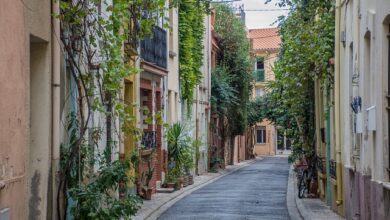Cost of Living in France: What to Expect

France is a country that effortlessly blends sophistication, culture, and natural beauty, making it a dream destination for tourists, expats, and retirees alike. However, understanding the cost of living is essential for anyone planning to visit, relocate, or settle in this diverse nation. From bustling cities like Paris to serene countryside towns, the cost of living can vary significantly depending on location, lifestyle, and personal preferences. In this guide, we’ll break down what to expect when it comes to housing, food, transportation, healthcare, education, and more.
1. Housing Costs
Housing is typically the largest expense for residents and newcomers in France. Prices vary dramatically between urban centers and rural areas.
- Paris : As one of the most expensive cities in the world, renting an apartment in Paris can be steep. A one-bedroom apartment in the city center costs around €1,500–€2,500 per month, while outside the city center, you might pay €1,000–€1,800.
- Lyon, Bordeaux, Nice : These popular cities are also pricey but slightly more affordable than Paris. Expect to pay €900–€1,500 for a one-bedroom apartment in the city center.
- Smaller Towns and Rural Areas : Outside major cities, housing becomes much more affordable. For example, in smaller towns like Toulouse, Nantes, or Annecy, a one-bedroom apartment might cost €600–€1,000 per month. In rural villages, rents can drop to €400–€700.
Buying Property : If you’re considering purchasing property, prices range from €4,000–€10,000 per square meter in Paris to €2,000–€4,000 in regional cities. Rural properties are significantly cheaper, often starting at €1,000 per square meter.
2. Food and Groceries
French cuisine is celebrated worldwide, and eating well doesn’t have to break the bank. Here’s what you can expect:
- Groceries : Shopping at local markets or supermarkets like Carrefour, Leclerc, or Monoprix is relatively affordable. A loaf of fresh baguette costs about €1, a liter of milk is around €1.20, and a dozen eggs might set you back €3–€4. Wine lovers will rejoice—bottles of decent table wine start at just €3–€5.
- Dining Out : Eating out in France is a pleasure, whether you opt for casual bistros or fine dining. A meal at an inexpensive restaurant costs around €12–€18, while a three-course dinner for two at a mid-range restaurant ranges from €50–€80. Michelin-starred restaurants, of course, come with a higher price tag.
Tip : Look for “menu du jour” (daily specials) at restaurants, which offer great value for money.
3. Transportation
France boasts an excellent public transportation system, making it easy to get around without owning a car.
- Public Transit : Monthly passes for public transportation in major cities cost approximately:
- Paris: €75–€80
- Lyon: €60–€70
- Marseille: €50–€60
- Taxis and Ride-Sharing : Taxis are widely available but can be pricey. Uber operates in many cities but is less common in rural areas.
- Driving : Owning a car involves additional costs such as insurance (€500–€1,000 annually), fuel (€1.60–€2.00 per liter), and tolls on highways.
- Trains : France’s SNCF rail network is efficient and connects cities quickly. For example, a second-class ticket from Paris to Lyon costs around €40–€80 if booked in advance.
Tip : Consider getting a Navigo or Carte Avantage card for discounted travel.
4. Healthcare
France has one of the best healthcare systems in the world, offering universal coverage through its state-run program, Sécurité Sociale . Most residents contribute to social security via payroll taxes, and the government covers 70–100% of medical expenses.
- Private Insurance : Many people supplement their coverage with private insurance (mutuelle ), costing €30–€100 per month depending on the plan.
- Out-of-Pocket Costs : Even with insurance, some fees may apply—for instance, a general practitioner visit costs around €25 before reimbursement.
- Prescriptions : Medications are heavily subsidized, so patients usually pay only a small fraction of the cost.
Tip : EU citizens can use their European Health Insurance Card (EHIC) for temporary stays, while non-EU residents should check visa requirements for health coverage.
5. Education
Education in France is highly regarded, and options cater to both locals and international families.
- Public Schools : Public schooling is free for residents, including university tuition, which remains low compared to countries like the U.S. or UK (around €200–€600 per year).
- Private Schools : Private institutions charge annual fees ranging from €5,000–€20,000, depending on the school’s prestige.
- International Schools : For expat families, international schools can be costly, with annual fees reaching €15,000–€30,000.
Tip : Bilingual programs are increasingly available in public schools, providing a balance between affordability and language learning.
6. Utilities and Internet
Utility bills depend on the size of your home and energy usage.
- Electricity, Heating, Cooling : Average monthly utility bills range from €100–€200 for a standard apartment.
- Internet and TV : High-speed internet packages with TV bundles cost about €30–€50 per month.
- Mobile Phones : Prepaid SIM cards are affordable, with data plans starting at €10–€20 per month.
7. Entertainment and Leisure
France offers countless opportunities for recreation, from cultural activities to outdoor adventures.
- Cinema Tickets : A movie ticket costs around €8–€12.
- Gym Memberships : Monthly gym fees range from €30–€70.
- Cultural Activities : Museum entry fees vary; for example, the Louvre charges €17 for adults, though many museums offer free admission on the first Sunday of the month or for EU residents under 26.
Tip : Take advantage of free events, such as concerts in parks during summer festivals.
8. Taxes
Understanding French taxation is crucial for long-term residents.
- Income Tax : France uses a progressive tax system, with rates ranging from 0% to 45%. There’s also a solidarity tax (contribution sociale généralisée , or CSG) of about 8%.
- Wealth Tax : Residents with assets exceeding €1.3 million are subject to a wealth tax (Impôt sur la Fortune Immobilière ), primarily targeting real estate holdings.
- VAT : Value-added tax (TVA) is 20% for most goods and services, though reduced rates apply to essentials like food (5.5%) and books (5.5%).
Regional Variations
The cost of living varies greatly across regions:
- Expensive Regions : Île-de-France (Paris region), Provence-Alpes-Côte d’Azur (French Riviera), and Corsica tend to be pricier due to demand and tourism.
- Affordable Regions : Rural areas in Brittany, Normandy, and Occitanie offer lower costs for housing, groceries, and leisure.



